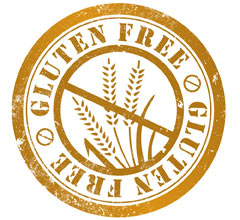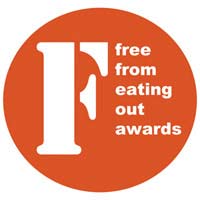 Have you decided to give up gluten? There are a number of reasons why you might:
Have you decided to give up gluten? There are a number of reasons why you might:
- digestive health.
People diagnosed with celiac disease (known as coeliac disease in the UK) are instructed to remove gluten from their diet. That means anything that contains wheat, barley or rye – and usually oats too. This may also help people diagnosed with Irritable Bowel Syndrome.
-
skin health.
People with dermatitis herpetiformis are also advised to avoid gluten – and some studies have found that people with psoriasis are also helped by a gluten free diet. I have also heard that eczema can be helped in this way too.
-
mental health.
‘Brain fog’ is often cited as a symptom that people with CD suffer pre-diagnosis. Depression may be relieved with a gluten free diet – and many, many parents report that the behaviour of children improves when diagnosis of CD is made, and a gluten free diet started. But there are other (sadly, less reversible) reasons to exclude gluten. In some cases of autism, a gluten-free casein-free diet can help; schizophrenics are also advised that a gluten free diet can help.
- allergic reaction.
While not necessarily celiac, some people can have an allergy to the protein found in wheat – as to any other food – that requires a wheat-free diet (which need not necessarily be a gluten-free diet).
Whichever is your reason for choosing to avoid eating gluten, I hope that you find something useful in this blog. If you’re new to avoiding gluten, you could start with:
- Things to avoid if you are avoiding gluten
- Things you CAN eat and avoid gluten
- A gluten free alphabet – more things you can eat
- How to survive the first year of living gluten free
I’m glad you visited – do leave me a comment to let me know you were here.


I just stumbled upon your site and signed up for the email newsfeed. I was diagnosed with celiac after the birth of my daughter (late 30’s). Because she has a %chance of having it, I avoid gluten in her diet too. Your blog should be a great resource for us (and others I imagine). We look forward to future posts. Thank you.
Hi Siena – thanks for dropping by.
I had heard that pregnancy can be a trigger for celiac. How old is your daughter now? Will you consider introducing gluten into her diet when she is older?
I think anyone of Irish descent who has a c-section should automatically be checked for celiac. At those moments women have four circumstances working against them: pregnancy, surgery, stress from new baby & genetics – all happening at one time … That was my experience which lead to a full year of being unwell with a new baby. Not a good formula.
I’ve started to sloooooowwwwwly allow occasionally gluten in my daughters diet. She’s turning five in July. I kept her on a strict gluten & dairy-free diet for the first four years. Now when she eats either I can tell her digestive system gets upset. Could be due to the introduction to new food, or gluten intolerance. Hard to tell. Better safe than sorry.
I learn something new every time I visit. Thanks for the great post.
Gluten is not good for anyone, even for people with iron stomach. Thankfully, super markets and food stores carry several gluten-free products.